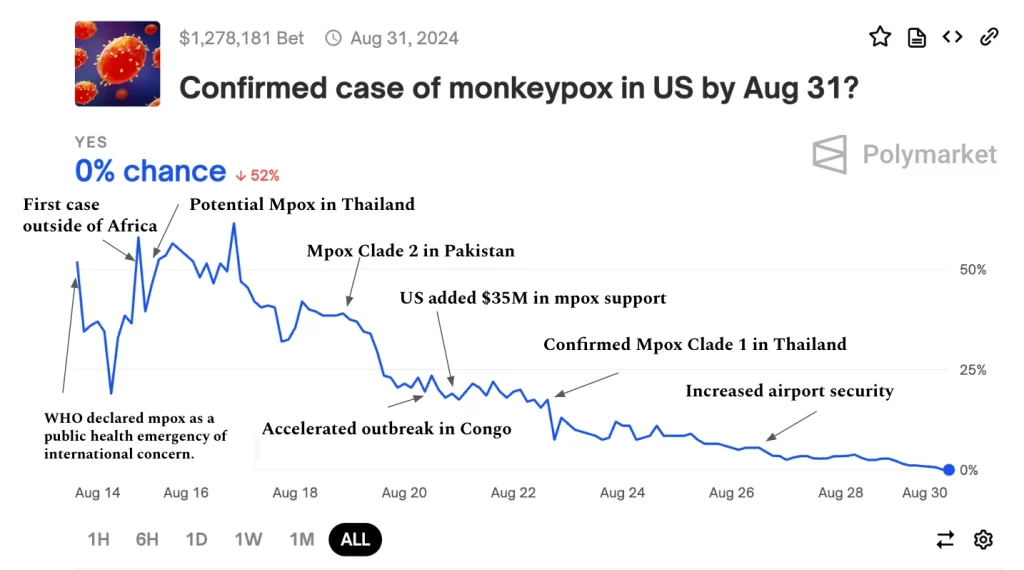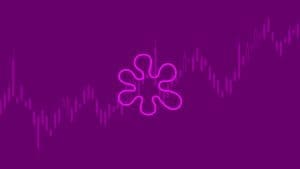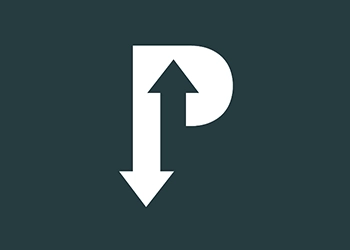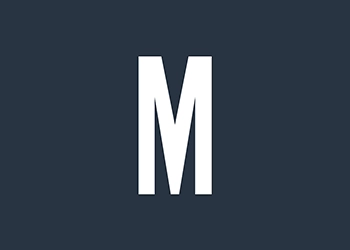After showing a coin toss’ chance of a new pandemic, Polymarket’s US Mpox market concluded August with a 0% chance of confirmed cases of Mpox in the U.S. This market focused exclusively on Mpox Clade 1, the more concerning virus strain.
Clade 1, also known as the Central African or Congo Basin clade, is more worrisome than Clade 2 (the West African clade) due to its higher virulence and greater transmission potential. Despite the availability of vaccines against Clade 1, concerns persist about Mpox becoming the next pandemic.
Initial trader sentiment suggested a U.S. Mpox outbreak. The original price of a “No” contract was only 38 cents. However, as the likelihood of an epidemic faded, the price for “No” contracts skyrocketed. On Aug. 30, “No” contracts cost 98 cents.

Mpox Emergency Odds Crash After Aid Reports
After an upsurge of cases in many African countries, the World Health Organization (WHO) declared Mpox a Public Health Emergency of International Concern (link outdated) on Aug. 14. “Yes” contracts cost 52 cents after this announcement.
That same day, the U.S. Department of Health and Human Services (HHS) issued a statement reassuring that the risk of a Clade 1 outbreak in the U.S. was “very low.” This calmed market fears, reducing the price of “Yes” contracts to 19 cents.
Interestingly, the confirmation of Thailand’s first Mpox Clade 1 case (link outdated) had little to no effect on the market. This is likely due to the global containment efforts in affected African countries proving effective. The spread of the infection had slowed significantly, with strong international support, including additional funding from USAID. This gave the market confidence that the outbreak was under control, reducing the perceived risk of a widespread epidemic.
However, the market’s price started to decrease around Aug. 20, following USAID’s announcement of an additional $35 million (link outdated) to support the Mpox outbreak response in Central and Eastern Africa.
By Aug. 27, the CDC and the U.S. Department of Homeland Security implemented Mpox screening at several major airports nationwide. The screening targeted passengers arriving from regions with known Mpox outbreaks.
Prediction markets like the one for Mpox are a dynamic, real-time reflection of how public perception shifts in response to unfolding events. As seen with the fluctuating prices of ‘Yes’ and ‘No’ contracts, every new piece of information—from international cases to government interventions—impacts market sentiment. The market isn’t static; it reacts instantly to developments such as WHO declarations, government reassurances, or even new funding for outbreak containment.
Prediction markets are an excellent opportunity to engage with real-world events in a way that makes you more than a passive observer. Participating in this market can sharpen your analytical skills and inform you about global health issues.

























